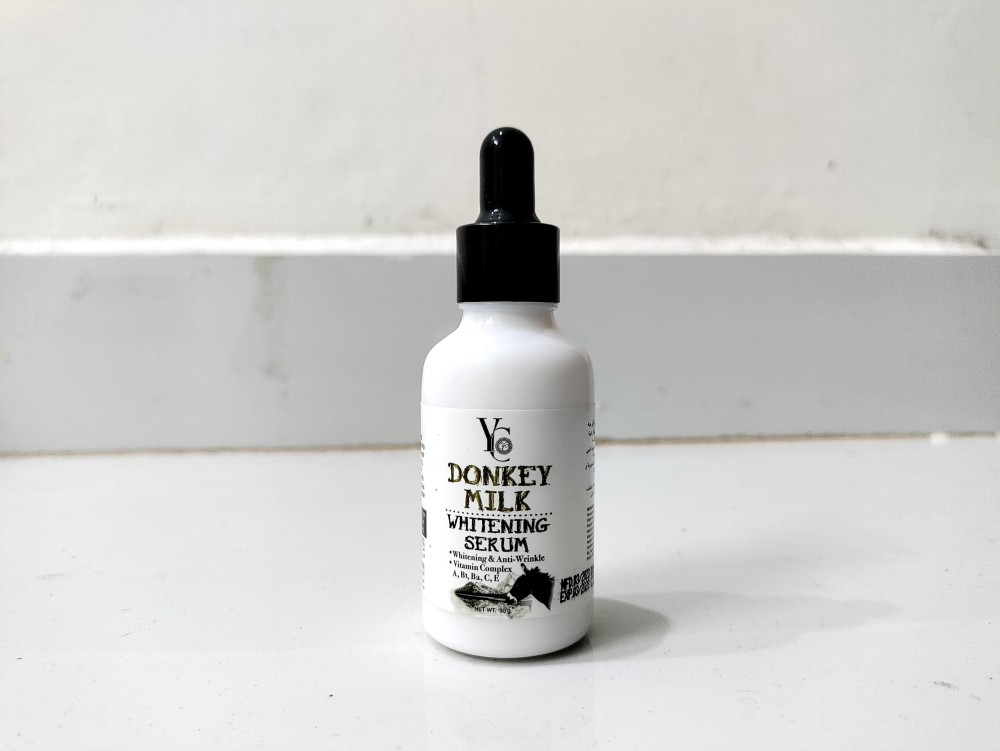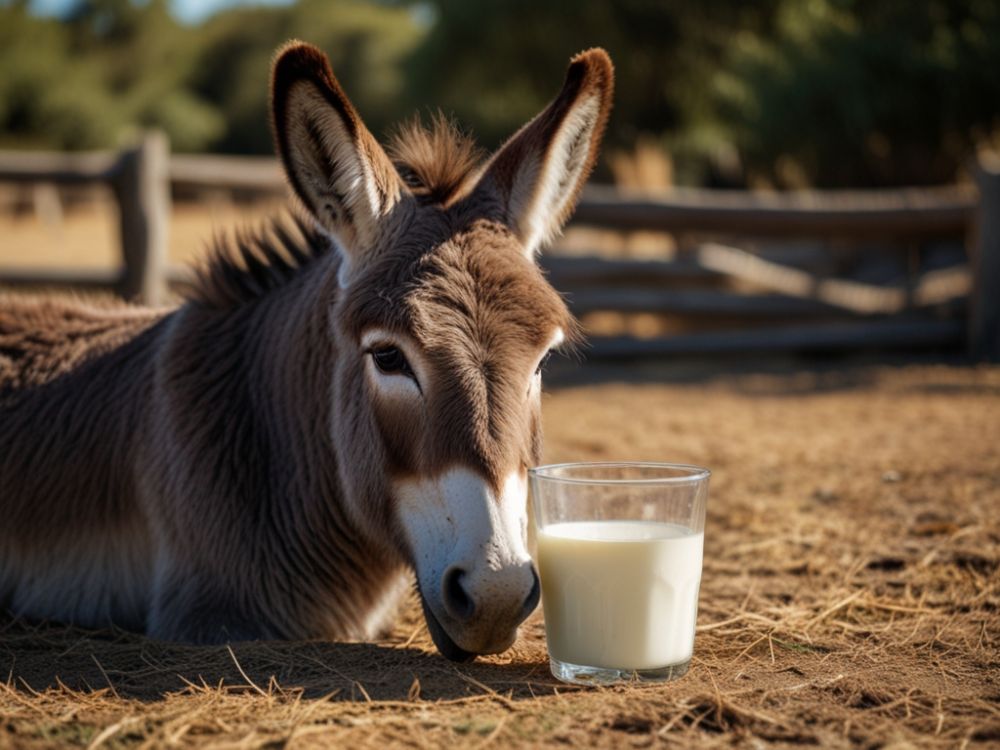Physical Address
304 North Cardinal St.
Dorchester Center, MA 02124
Physical Address
304 North Cardinal St.
Dorchester Center, MA 02124

Peptides, snail mucin, retinol and the latest and greatest are one thing, beauty secrets that have been around for centuries are quite another – they are here to stay.
Donkey milk skincare, also known as Cleopatra’s beauty secret, is making a splash in the beauty world right now, and for good reason – it’s packed with nutrients that can do wonders for your skin.
If you’re already skeptical, we’ve done the research for you. Let’s discover the little-known benefits of donkey milk for skin and how you can incorporate it into your skin care routine.

Donkey milk is exactly what it sounds like: creamy milk produced by female donkeys (jenny). Although it is less common than cow’s milk, it is gaining recognition for its unique composition and benefits, especially for skin care.
Its composition is extremely similar to human breast milk, which makes it one of the most hypoallergenic types of milk.
Aside from its basic nutritional profile, donkey milk is packed with bioactive compounds that can give your skin a serious glow.
This ancient elixir of youth (aka the most Googled ingredient of 2021) has a history as rich and luxurious as its texture. Legend has it that the legendary Egyptian queen Cleopatra enjoyed daily donkey milk baths to maintain her famously flawless complexion. While some historians debate the exact number of donkeys required for such an extravaganza (rumored to be in the hundreds!), donkey milk’s longstanding reputation for beauty remains intact.
But Cleopatra wasn’t the only one on this ancient beauty secret. Hippocrates, the father of modern medicine, prescribed donkey milk for various ailments, including skin diseases.
Once upon a time, donkey milk was a drink reserved for the elite. But guess what? It’s not just for the privileged few anymore. It is getting its rightful place in the beauty space, especially in K-beauty.
Researchers have searched for the health and beauty secrets of donkey milk and discovered that it is packed with skin-loving compounds. Think it’s full of lactose, casein, vitamins A, B1, B2, B6, D and E that are good for your body and skin. Moreover, celebrities like Victoria Beckham, Jennifer Lopez, Kim Kardashian and Miranda Kerr already love it.
Donkey milk can reverse sun damage caused by UV rays and improve the skin’s barrier function by adding a protective layer. Recent research it proves — it stimulates filaggrinthe protein responsible for maintaining a healthy skin barrier. Since sun damage can weaken this barrier, donkey milk helps restore it, making your skin more resilient.
Proteins like fatty acids and phospholipids in donkey’s milk improve the ability of the skin to attract and lock in hydration. Jenni milk moisturizers are also proven to outperform regular creams and provide deeper hydration. This makes donkey milk skin care extra moisturizing and hydrating. So, it’s safe to consider it your skin’s ultimate defense system against dryness and irritation.
Donkey milk is full of vitamins A, C and D. Surprisingly, its high vitamin A content accelerates the renewal of skin cells and helps it stay younger. With regular use, expect to see younger, brighter and silkier skin.
Milk is also naturally loaded with vitamin D, which helps prevent premature aging. A rich blend of proteins, phospholipids, and ceramides work together to tighten, regenerate, and smooth skin—like a mini facelift in a bottle.
The unique composition of donkey milk suppresses melanin production. Research published in Dietary limits reveals that it boasts a powerful ability to suppress the production of melanin, the process that gives your skin its color (the more melanin, the darker your skin). It does this by targeting tyrosinase, a key enzyme involved in melanin production, and suppressing the genes that produce the pigment.
What’s more, it’s 4 times richer in vitamin C than cow’s milk, so that means more shine. Simply put, donkey milk slows down the processes that cause dark spots and uneven skin tone.
Its potential for skin rejuvenation lies in its ability to interact with the cells that maintain the structure and elasticity of the skin. Deep in the skin, powerful cells called fibroblasts produce collagen, a protein that keeps it looking young. Research shows that donkey milk can stimulate these fibroblasts and get them moving they create more collagen. This increase in collagen will result in improved skin elasticity and fewer fine lines. Not only that, this cellular communication could potentially speed up wound healing, leading to skin renewal.
The anti-inflammatory properties of donkey milk relieves redness and eases discomfort caused by inflammation. Higher levels lactoferrin (protein in human milk) i lysozyme (antimicrobial enzyme) compared to cow’s milk acts as a powerful anti-inflammatory and antimicrobial agent against irritation. When the skin barrier is strengthened, inflammation is reduced, making it a better alternative to steroid creams. It also relieves acne, psoriasis, rosacea and stressed skin.
It’s an excellent natural exfoliator due to its high content of lactic acid, a mild alpha hydroxy acid (AHA) known for breaking down dead skin cells. Lactic acid encourages the removal of old, damaged skin cells, making way for new, healthy ones. This gentle exfoliation reveals a fresher layer of skin while helping to fade dark spots, hyperpigmentation and even scars.

Drink fresh: enjoy on its own with fresh milk or mix it into smoothies and shakes. Get it from a reputable supplier and handle it with proper hygiene.
Cook with it: donkey milk can replace cow’s milk when baking, making sauces and soups.
Skin care products: go for products that contain a high percentage of this ingredient, such as
DIY recipes: with it you can make DIY skin care recipes:
Although it is a relatively safe and well-tolerated ingredient for most skin types, those with lactose sensitivities and allergies should be aware of potential reactions.
People who are lactose intolerant may have mild indigestion if they consume a lot of donkey milk because it has more lactose than cow’s milk. Locally, however, it is less likely to cause a reaction.
Although rare, some people may be allergic to the proteins found in donkey milk. This can lead to reactions such as hives, itching or respiratory symptoms. If you have a history of milk allergies, consult your doctor first.
To test for allergies, start by applying a small amount and then gradually work it all over your skin. If your skin tolerates it well, increase the usage slowly.
Because it is incredibly gentle and soothing, it is ideal for all skin types, including the most sensitive. It is especially beneficial for acne-prone skin—thanks to lactic acid—a powerful exfoliant that accelerates skin cell renewal. However, always do a patch test before applying any new product to your entire face.
You can buy them online, in specialized beauty stores or even directly from the farms that produce the milk.
Although topical use is generally considered safe, pregnant and breastfeeding women should always consult their doctor before trying any fantastic product.
Most skin care ingredients are compatible with milk. However, as with any new product, always introduce it gradually and avoid overdoing it with active ingredients such as retinol or acids. Use it on alternate days or at different times of the day.
Make sure the source is ethical. Find brands that prioritize donkey welfare and humane farming. Most reputable brands will be upfront about their sourcing and animal welfare.
A can of donkey’s milk reduce hyperpigmentation. Basically, its melanin blocking action and gentle exfoliating effect can brighten and even out your skin.
Compared to cow’s milk, donkey’s milk is rarer and often produced in small batches (like goat’s milk), so it is more expensive. However, as its popularity grows, more and more skin care products are now available with it.
Donkey milk is an ancient beauty secret backed by modern science. The benefits of donkey milk for the skin are numerous — deeply hydrating, anti-aging, brightening, soothing and suitable for all skin types. It will soon be found in cosmetic formulas. Pair it with a balanced skincare regimen to get the most out of this ingredient. Using a mixture of products to hydrate, protect and exfoliate will help this ancient elixir work better on your skin.
Have you tried any donkey milk products on your skin or want to? We’d love to hear your experiences in the comments.